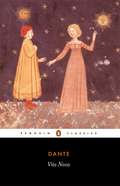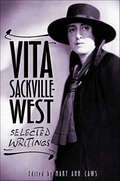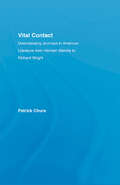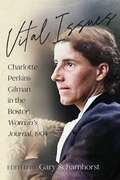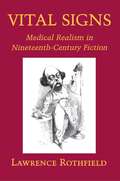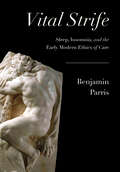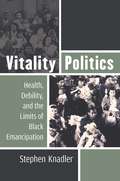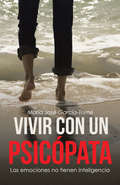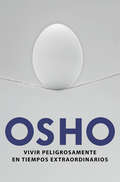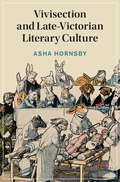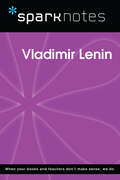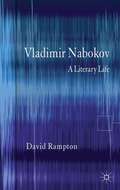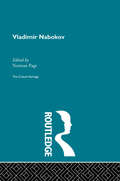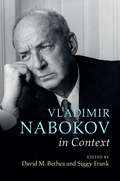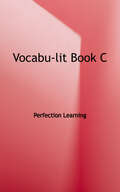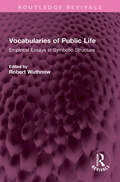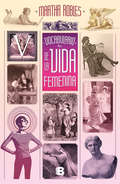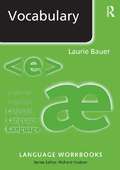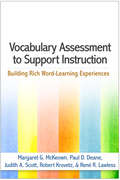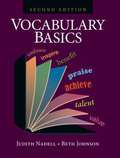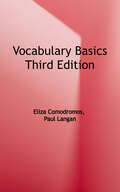- Table View
- List View
Vita Nuova
by Dante AlighieriA unique treatise by a poet, written for poets, on the art of poetry, LA VITA NUOVA is elaborately and symbolically patterned, consisting of a selection of Dante's early poems, interspersed with his own prose commentary. The poems themselves tell the story of his love for Beatrice, from their first meeting at a May Day party in her father's house, through Dante's sufferings and his attempts to conceal the true object of his devotion by the use of 'screen-loves', to his overwhelming grief ather death, ending with the transformative vision of her in heaven. These are some of the richest love poems in literature and the movement from self-pitying lament to praise for the beloved's beauty and virtue, illustrate the elevating power of love.
Vita Sackville-West: Selected Writings
by Vita Sackville-WestAristocrat, novelist, essayist, traveler, and lover of Virginia Woolf, Vita Sackville-West lived a fascinating and daring life on the periphery of the Bloomsbury circle. She wrote in an astounding variety of genres, including travel narrative, historical and literary studies, poetry, fiction, and essays, and is probably best known or her novels, The Edwardians and All Passion Spent, and incomparable writings about English country houses and gardens. Here, for the first time, is an anthology that represents the full expanse of her interests and styles. Over half of the works, including intimate diaries and a dream notebook, have never been published. Edited by a foremost expert on the Bloomsbury circle, Vita Sackville-West: Selected Writings provides the best and most accessible introduction to this unique writer.
Vital Contact: Downclassing Journeys in American Literature from Melville to Richard Wright (Literary Criticism and Cultural Theory)
by Patrick ChuraFirst Published in 2006. Routledge is an imprint of Taylor & Francis, an informa company.
Vital Issues: Charlotte Perkins Gilman in the Boston Woman's Journal, 1904
by Gary ScharnhorstVital Issues presents an annotated scholarly edition of the weekly columns Charlotte Perkins Gilman, the most prominent American feminist intellectual during the early twentieth century, contributed in 1904 to the Boston Woman&’s Journal, the leading journal of the US woman&’s movement.At the height of her career in 1904, Charlotte Perkins Gilman contributed dozens of essays to the Boston Woman&’s Journal, &“the only Voice of the Woman&’s Movement in this country, if not the world,&” as she later declared. Gilman aimed to transform &“the whole woman movement&” because she believed the right to vote was a necessary but insufficient goal. Her weekly column presumed that &“the woman&’s movement is larger than the suffrage movement and includes it; and that the very cause to which this paper is devoted will be most advanced by a more inclusive treatment.&”These essays silhouette the foundations of her feminism and anticipate much of her subsequent writing.
Vital Signs: Medical Realism in Nineteenth-Century Fiction (Literature in History)
by Lawrence RothfieldVital Signs offers both a compelling reinterpretation of the nineteenth-century novel and a methodological challenge to literary historians. Rejecting theories that equate realism with representation, Lawrence Rothfield argues that literary history forms a subset of the history of discourses and their attendant practices. He shows how clinical medicine provided Balzac, Flaubert, Eliot, and others with narrative strategies, epistemological assumptions, and models of professional authority. He also traces the linkages between medicine's eventual decline in scientific and social status and realism's displacement by naturalism, detective fiction, and modernism.
Vital Strife: Sleep, Insomnia, and the Early Modern Ethics of Care
by Benjamin ParrisVital Strife examines the close yet puzzling relationship between sleep and ethical care in early modernity. The plays, poems, and philosophical essays at the heart of this book—by Jasper Heywood, William Shakespeare, Edmund Spenser, John Milton, and Margaret Cavendish—explore the unconscious motions of corporeal life and the drowsy forms of sentience at the boundaries of human thought and intentionality. Benjamin Parris shows how these writers, although trained under the Renaissance humanist paradigm of attentive care, begin to dissolve the humanist coupling of virtue with vigilance by giving credence to the vital power of sleep. In contrast to humanist thinkers who equated sleep with carelessness, these writers draw on the ancient Stoic principle of oikeiôsis—the process of orienting the living being toward its proper objects of care, beginning with itself—in asserting the value of sleep, while underscoring insomnia's threat to the ethical flourishing of persons and polity alike. Parris offers an important revaluation of Stoic philosophy, which has too often been misconstrued as renouncing feeling and sympathetic connection with others. With its striking new account of the reception of Stoicism and attitudes toward sleep and sleeplessness in early modern thought, Vital Strife reveals the period's mounting concern with the regenerative nature of physical life and its elaboration of a newfound ethics of care.
Vitality Politics: Health, Debility, and the Limits of Black Emancipation (Corporealities: Discourses Of Disability)
by Stephen KnadlerVitality Politics focuses on a slow racial violence against African Americans through everyday, accumulative, contagious, and toxic attritions on health. The book engages with recent critical disability studies scholarship to recognize that debility, or the targeted maiming and distressing of Black populations, is a largely unacknowledged strategy of the U.S. liberal multicultural capitalist state. This politicization of biological health serves as an instrument for insisting on a racial state of exception in which African Americans’ own unhealthy habits and disease susceptibility justifies their legitimate suspension from full rights to social justice, economic opportunity, and political freedom and equality. The book brings together disability studies, Black Studies, and African American literary history as it highlights the urgent need and gives weight to a biopolitics of debilitation and medicalization to better understand how Black lives are made not to matter in our supposedly race-neutral multicultural democracy.
Vivir con un psicópata: Las emociones no tienen inteligencia
by María José García-ToméTODOS SOMOS VULNERABLES A INSTALAR UN PSICÓPATA EN NUESTRA VIDA Una mujer madura, psicóloga de profesión, con dos hijos adultos, se reencuentra con un antiguo amor de juventud. Después de treinta años sin saber nada el uno del otro, el destino los pone frente a frente en el último tramo de sus vidas. El deseo de escribir el final de una historia no vivida, que a menudo queda latente en ese primer amor, les empuja a dar rienda suelta a esa segunda oportunidad que disipe sus frustraciones. La protagonista viene de un desierto emocional de largo recorrido deseosa de reivindicar su condición de mujer, y sin apenas darse cuenta se va dejando atrapar por la tela de araña tejida por un psicópata que la maneja con habilidad. Descubre sus engaños a través de la red y aquella visión atroz de su mundo virtual la deja en estado de shock, instalándose en una lucha desesperada contra ella misma sin saber que camino tomar. Apoyada por su profesión estudia en profundidad los rasgos de la personalidad psicopática, elaborando un perfil del personaje que le va a servir para superar la situación. Dedicado a todas las mujeres y hombres que aun siendo capaces de afrontar cualquier reto que les plantee la vida, en sus relaciones se muestran sumisos y soportan desprecios, humillaciones y engaños, esperando un cambio que nunca llega.
Vivir peligrosamente en tiempos extraordinarios
by OshoOsho es conocido como una de las figuras más provocadoras de nuestro tiempo. Este libro, compuesto de una selección de sus intempestivos discursos, nos presenta una visión general de los conceptos clave del ideal de «vivir peligrosamente». Crítico con las religiones tradicionales y sus normas y doctrinas, que imponen una «esclavitud psicológica», su ideario pone énfasis en la responsabilidad personal y la libertad. Su misión, según él, era conseguir que regresaran a la vida aquellos que vivían como si estuvieran muertos. Esta selección de sus discursos nos proporciona el contexto para entender el singular acercamiento de Osho al camino de la espiritualidad, destaca aquellos temas a los que recurre reiteradamente para encontrar respuesta a sus preguntas y nos ofrece sus invitaciones para un nuevo mundo poblado de seres ilustrados. «Mi palabra para los que rezan es "amor"... el amor no es haciaun dios invisible. Es amor a todo lo visible: seres humanos, animales, árboles, océanos, montañas...»
Vivisection and Late-Victorian Literary Culture (Cambridge Studies in Nineteenth-Century Literature and Culture)
by Asha HornsbyThe nineteenth-century antivivisection movement was supported by a striking number of poets, authors, and playwrights who attended meetings, signed petitions, contributed funds, and lent their pens to the cause. Yet live animal experimentation also permeated the Victorian imagination and shaped British literary culture in ways that the movement against it did not anticipate and could not entirely control. This is the first sustained literary-critical study of the topic. It traces responses to the practice through an extensive corpus of canonical, popular, and ephemeral texts including newspapers, scientific books, and government documents. Asha Hornsby sheds light on the complex entanglement of art and science at the fin-de-siècle and explores how the representational and aesthetic preoccupations opened up by vivisection debates often sat uneasily alongside a socio-political commitment to animal protection. Despite efforts to present writing and vivisecting as rivalrous activities, author and experimenter, pen and scalpel, often resembled each other.
Vladimir Lenin (SparkNotes Biography Guide)
by SparkNotesVladimir Lenin (SparkNotes Biography Guide) Making the reading experience fun! SparkNotes Biography Guides examine the lives of historical luminaries, from Alexander the Great to Virginia Woolf. Each biography guide includes:An examination of the historical context in which the person lived A summary of the person&’s life and achievements A glossary of important terms, people, and events An in-depth look at the key epochs in the person&’s career Study questions and essay topics A review test Suggestions for further reading Whether you&’re a student of history or just a student cramming for a history exam, SparkNotes Biography guides are a reliable, thorough, and readable resource.
Vladimir Nabokov
by David RamptonVladimir Nabakov considers the novelist's aesthetic precepts and practice and the distinctive character of his work and the book also gives consideration of his fiction in the larger context of the modernist and postmodernist enterprise. It analyses the importance of the novels' challenges to all sorts of aesthetic and moral presumptions (including some of Nabakov's own). Readers are thus encouraged to draw their own conclusions about the issues raised in Nabakov's work.
Vladimir Nabokov
by Norman PageThis set comprises of 40 volumes covering nineteenth and twentieth century European and American authors. These volumes will be available as a complete set, mini boxed sets (by theme) or as individual volumes. This second set compliments the first 68 volume set of Critical Heritage published by Routledge in October 1995.
Vladimir Nabokov
by Paul D. MorrisVladimir Nabokov (1899-1977), the eminent Russian-American writer and intellectual, is best known for his novels, though he was also the author of plays, poems, and short stories. In this important new work, Paul D. Morris offers a comprehensive reading of Nabokov's Russian and English poetry, until now a neglected facet of his oeuvre. Morris' unique and insightful study re-evaluates Nabokov's poetry and demonstrates that poetry was in fact central to his identity as an author and was the source of his distinctive authorial - lyric - voice.After offering a critical overview of the multi-staged history of the reception of Nabokov's poetry and an extensive analysis of his poetic writing, Morris argues that Nabokov's poetry has largely been misinterpreted and its place in his oeuvre misunderstood. Through a detailed examination of the form and content of Nabokov's writings, Morris demonstrates that Nabokov's innovations in the realms of drama, the short story, and the novel were profoundly shaped by his lyric sensibility.
Vladimir Nabokov in Context
by Siggy Frank David BetheaVladimir Nabokov, bilingual writer of dazzling masterpieces, is a phenomenon that both resists and requires contextualization. This book challenges the myth of Nabokov as a sole genius who worked in isolation from his surroundings, as it seeks to anchor his work firmly within the historical, cultural, intellectual and political contexts of the turbulent twentieth century. Vladimir Nabokov in Context maps the ever-changing sites, people, cultures and ideologies of his itinerant life which shaped the production and reception of his work. Concise and lively essays by leading scholars reveal a complex relationship of mutual influence between Nabokov's work and his environment. Appealing to a wide community of literary scholars this timely companion to Nabokov's writing offers new insights and approaches to one of the most important, and yet most elusive writers of modern literature.
Vocabu-Lit, Book C: Building Vocabulary Through Literature
by PLC Editors StaffIn this literature-based vocabulary program, students first read a short, unabridged passage with 10 targeted vocabulary words. The students then complete six exercises that teach strategies and reinforce word meanings. After every 10 lessons students complete a review lesson. <p><p>Grade 3
Vocabularies of Public Life: Empirical Essays in Symbolic Structure (Routledge Revivals)
by Robert WuthnowFirst published in 1992, Vocabularies of Public Life explores the revolution that has taken place in our understanding of contemporary culture and decodes a number of the symbols which now dominate public life. Wuthnow divides the essays collected here into three distinct ‘vocabularies.’ Part I examines the ways in which religious and scientific languages function as vocabularies of conviction in public life, Part II focuses on music and art as vocabularies of expression, and Part III considers law, ideology, and public policy as vocabularies of persuasion. The contributors discuss such diverse subjects as American spiritualism, the syntax of modern dance and the social contexts of number one songs. What unifies the book is the common concern with the concrete, everyday manifestations of culture and the importance of understanding its basic structure. This book will be of interest to specialists and scholars of various disciplines such as linguistics, literature, media studies, popular culture, and sociology.
Vocabulario de la vida femenina
by Martha RoblesEsta obra, única por sus características y aspiraciones, desvela un sentido del idioma que hasta hace poco se mantuvo oculto: su aspecto femenino. En una época de grandes transformaciones en la que es necesario que los avances de género se asienten y permeen toda manifestación social y cultural, es indudable la exigencia de contar con un vocabulario que dé cuenta de este escenario en el que se desarrollan las sociedades actuales. Así, mediante la búsqueda de lo que esconden los vocablos, a veces desde la orilla de la denuncia y lo pocas veces expresado, Martha Robles se da a la inmensa tarea de registrar significados actuales, dando luz nueva a la palabra que nombra e indaga a la mujer y su universo. "Este Vocabulario de la vida femenina ha buscado a la mujer y lo femenino en los senderos del lenguaje, en los placeres, en las costumbres, en la enfermedad, entre expresiones coloquiales en reductos de la miseria, en las presiones padecidas por las agitadas relaciones sociales, amorosas y de trabajo o en la soledad de las viudas, en el dolor de la abandonada, en la mordida del hambre".
Vocabulary (Language Workbooks)
by Laurie BauerRoutledge Language Workbooks are practical introductions to specific areas of language for absolute beginners. They provide comprehensive coverage of the area as well as a basis for further study. Language Workbooks can be used for independent study or as part of a taught class.Vocabulary:* covers issues such as the power of words to influence our perceptions* looks at the origins of words from English and other languages* explores the relationships between the meanings and shapes of words* examines the correlation of different kinds of words with different style levels* uses striking and entertaining examples to make fundamental points about the words we use* lays the groundwork for further study in morphology, lexical semantics, historical linguistics and lexicography.
Vocabulary Assessment to Support Instruction: Building Rich Word-Learning Experiences
by Margaret G. Mckeown Judith A. Scott Paul D. Deane René R. Lawless Robert KrovetzVocabulary development is essential for learning, but conventional vocabulary assessments lack the range and flexibility to support K–12 classroom teachers in making instructional decisions. Drawing on linguistics, educational psychology, and educational measurement, this book offers a fresh perspective on word learning and describes powerful, precise assessment strategies. Guidelines are presented for selecting which words to teach, evaluating the depth and richness of students' word knowledge and their ability to apply it in complex contexts, designing effective instructional practices, and using technology to create adaptive and scalable assessments. User-friendly features include sample test items, classroom examples, a glossary, and suggested print and online resources.
Vocabulary Basics
by Beth Johnson Judith NadellIt is important to have a strong vocabulary. Words can make you a better reader, speaker, thinker, and learner. By working with the chapters in this book, you will greatly add to your vocabulary--and to your life as well.
Vocabulary Basics, Third Edition
by Paul Langan Eliza ComodromosWords have power. They express our emotions, convey our ideas, articulate our opinions, and reveal our thoughts. Students without an expansive vocabulary are challenged when asked to do these tasks. Furthermore, weak vocabularies limit students' understanding of what they read and the clarity of what they write. Many teachers tell us that their students' vocabularies are inadequate for academic demands. Vocabulary Basics aims to correct this problem. In 30 chapters divided into five units, it teaches 240 important words and several word-learning strategies.
